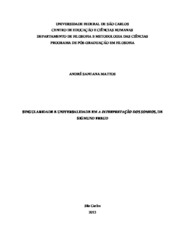| dc.contributor.author | Mattos, André Santana | |
| dc.date.accessioned | 2016-06-02T20:13:15Z | |
| dc.date.available | 2013-12-09 | |
| dc.date.available | 2016-06-02T20:13:15Z | |
| dc.date.issued | 2013-09-26 | |
| dc.identifier.citation | MATTOS, André Santana. Singularity and universality in Sigmund Freud s The interpretation of
dreams. 2013. 194 f. Dissertação (Mestrado em Ciências Humanas) - Universidade Federal de São Carlos, São Carlos, 2013. | por |
| dc.identifier.uri | https://repositorio.ufscar.br/handle/ufscar/4879 | |
| dc.description.abstract | In The interpretation of dreams, Freud presents a rich material of dream analyses, which is articulated with the establishment of general theses about the dream, leading into the metapsychological formulations about the psychic apparatus carried out in the seventh and last chapter. With the purpose of investigating the relations between singularity and universality that are characterized in the book, we have distinguished, among these three epistemic planes, two moments where it is constituted, in which one of them, a relation between two of those planes. In the first moment, we have analyzed the relation that finds itself in the domain between one dream and all dreams, i.e., between the detailed analysis of a singular dream and the general theses about the dream. We have identified that in the articulation between these two terms Freud makes use of the profound analysis of singular cases, taken as exemplar cases that present more clearly a determinate general characteristic of dream, but he also extends himself in brief analyses of various dreams, dwelling on the plurality of experience that articulates itself to a general thesis. In a second moment we have analyzed the relations that are at stake when we take the dream as one psychic formation among others, establishing epistemic relations with the psychopathological formations and with the psychic apparatus, which should be responsible for all psychic formations. While Freud initially intends to base the explication of psychopathological formations in the explication of dream, this epistemic order is inverted, in so far as it is based on the psychology of neurosis that he is going to justify the universality of the presence of the infantile desire on dream. In the same way, while a first reading that tried to understand the schema of the psychic apparatus only based on the interpretation of dreams would find its limit, it is necessary to recognize that there is a reciprocal subordination between the interpretation and the metapsychological explanation, as asserted by Monzani. | eng |
| dc.description.sponsorship | Universidade Federal de Minas Gerais | |
| dc.format | application/pdf | por |
| dc.language | por | por |
| dc.publisher | Universidade Federal de São Carlos | por |
| dc.rights | Acesso Aberto | por |
| dc.subject | Psicanálise freudiana - filosofia | por |
| dc.subject | Freud, Sigmund, 1856-1939 | por |
| dc.subject | Singularidade | por |
| dc.subject | Universalidade | por |
| dc.subject | Interpretação de sonhos | por |
| dc.subject | The interpretation of dreams | eng |
| dc.subject | Singularity | eng |
| dc.subject | Universality | eng |
| dc.title | Singularidade e universalidade em A interpretação dos sonhos, de Sigmund Freud | por |
| dc.title.alternative | Singularity and universality in Sigmund Freud s The interpretation of
dreams | eng |
| dc.type | Dissertação | por |
| dc.contributor.advisor1 | Monzani, Luiz Roberto | |
| dc.contributor.advisor1Lattes | http://lattes.cnpq.br/2036732603638197 | por |
| dc.description.resumo | Em A interpretação dos sonhos, Freud apresenta um rico material de análises de sonhos, que se articula ao estabelecimento de teses gerais sobre o sonho, vindo a desembocar, no sétimo e último capítulo, nas formulações metapsicológicas acerca do aparelho psíquico. Com o propósito de investigar as relações entre singularidade e universalidade que se configuram na obra, distinguimos, entre estes três planos epistêmicos, dois momentos onde se constitui, em cada um deles, uma relação entre dois daqueles planos. Em um primeiro momento, analisamos a relação que se situa no domínio entre um sonho e todos os sonhos, isto é, entre a análise pormenorizada de um sonho singular e as teses gerais sobre o sonho. Identificamos que, na articulação entre estes dois termos, Freud lança mão da análise em profundidade de casos singulares, tomados como casos exemplares que apresentam mais claramente certa característica geral do sonho, mas também se prolonga em análises breves de diversos sonhos, estendendo-se na pluralidade da experiência que se articula a uma tese geral. Em um segundo momento, analisamos as relações postas em jogo quando se toma o sonho em geral como uma formação psíquica singular, entre outras, estabelecendo relações epistêmicas com as formações psicopatológicas e com o aparelho psíquico, este que deveria ser, no limite, responsável por todas as formações psíquicas. Enquanto Freud se propõe, inicialmente, a fundamentar a explicação das formações psicopatológicas na explicação do sonho, essa ordem epistêmica é invertida, na medida em que é a partir da psicologia das neuroses que ele vai justificar a universalidade da presença do desejo infantil no sonho. Do mesmo modo, enquanto uma primeira leitura que tentasse derivar o esquema do aparelho psíquico apenas da interpretação de sonhos encontraria o seu limite, é preciso reconhecer que há uma subordinação recíproca entre a interpretação e a explicação metapsicológica, como afirma Monzani. | por |
| dc.publisher.country | BR | por |
| dc.publisher.initials | UFSCar | por |
| dc.publisher.program | Programa de Pós-Graduação em Filosofia - PPGFil | por |
| dc.subject.cnpq | CIENCIAS HUMANAS::FILOSOFIA | por |
| dc.contributor.authorlattes | http://lattes.cnpq.br/0371831964052713 | por |
